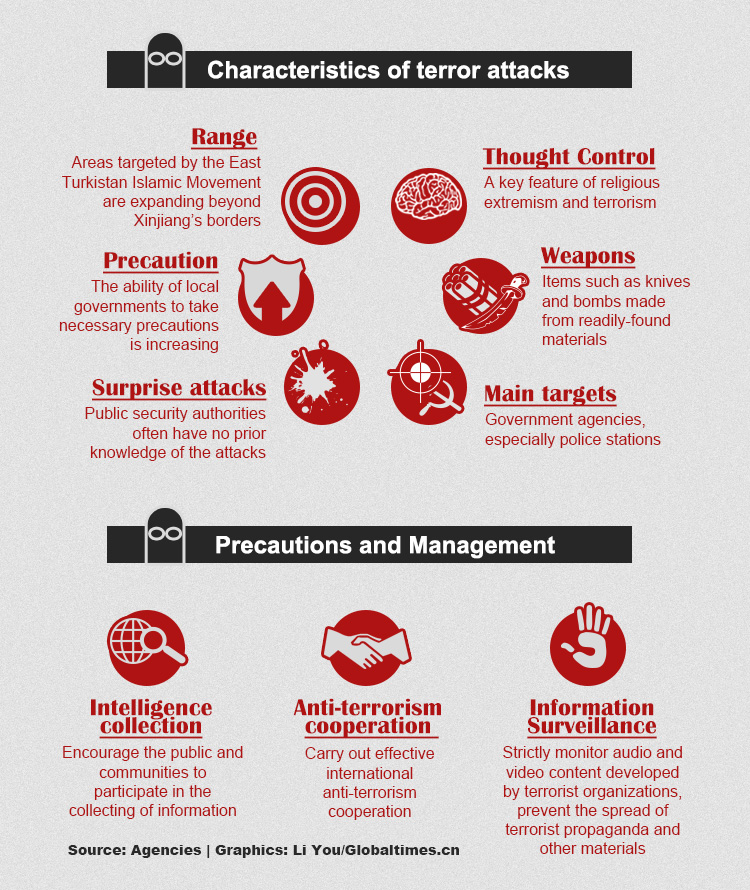SPECIAL COVERAGE >> Daily Specials
Terror attacks on rise in China: report
| Latest News |
| Terrorism surging in China: blue paper Domestic terrorism surged last year as China faces threats to social stability, read the nation's first blue paper on national security published on May 6. Issued by the University of International Relations and the Social Sciences Academic Press, the report found that domestic terrorism appeared to have expanded. Government bodies and police forces are the main targets of terrorists, often armed with weapons and overseas connections. | |
| China releases 1st National Security Blue Book Public Security Authorities Look to Minimize Terror Attacks | |
| Main Contents |
| 4/23 | Bachu, Xinjiang Uyghur Autonomous Region | Dozens of thugs armed with knives and incendiary devices attacked the township governmental building, a police station, a station of auxiliary police and a construction site. Casualties: 21 dead (including six attackers), two injured Rioters: six attackers were shot dead, eight were caught Xinjiang terror spree kills 21 |
| 6/26 | Lukqun, Xinjiang Uyghur Autonomous Region | Rioters attacked a local government building and police station, killing 24 people. Casualties: 24 dead (including 11 attackers), 17 injured Rioters: Mostly Uyghurs, 11 attackers were shot dead |
| 6/28 | Hotan, Xinjiang Uyghur Autonomous Region | A riot occurred in Hotan, Xinjiang, with over 100 terrorists attacking a number of people with weapons after gathering at local religious venues. New round of riots brings fresh violence to Xinjiang |
| 8/20 | Kashi, Xinjiang Uyghur Autonomous Region | A terrorist attack occurred in Kashi, Xinjiang, in which a policeman died in action against a violent terrorist group. Casualties: 15 dead Rioters: 15 attackers were shot dead Govt sets up national anti-terror team |
| 10/28 | Beijing | Usmen Hasan drove a jeep to "deliberately" plow through crowds, mainly tourists, along Chang'an Avenue where it runs through the Square, before crashing the vehicle outside the Tiananmen rostrum. Casualties: Five killed including three in jeep, 40 injured Rioters: Husanjan Wuxur, Gulnar Tuhtiniyaz, Yusup Umarniyaz, Bujanat Abdukadir, Yusup Ahmat Tiananmen car crash deemed terrorist attack |
| 11/16 | Bachu, Xinjiang Uyghur Autonomous Region | Police said 11 people were killed in an assault on a police station in Bachu county in Xinjiang. Casualties: 20 people dead (including nine attackers) Rioters: nine attackers were shot dead Xinjiang police attack under investigation |
| 12/15 | Shufu, Xinjiang Uyghur Autonomous Region | An "organized and premeditated" incident took place in Sayibage township of Shufu county, administered by Kashi in Xinjiang. Casualties: 16 people were killed (including 14 attackers) Rioters: 14 suspects were shot dead, and six have been arrested Six held after Xinjiang attack |
| 12/30 | Kashi, Xinjiang Uyghur Autonomous Region | Nine terrorists attacked a police station in Shache county in Kashi, Xinjiang. They wielded knives, threw explosives and set police cars on fire. Rioters: Eight terrorists were shot dead and another captured 8 dead in Xinjiang terror attack |

![]() Other issues:
Other issues:
On top of terrorism, the new Blue Book also says this country is dealing with more cyber security threats and environmental security concerns.
| NSC'S Functions |
Collusion between domestic and foreign terrorist groups is to blame for China’s recent terror attacks, according to the first National Security Blue Book.
According to the report, issued by the University of International Relations and Social Sciences Academic Press on May 6, many of the nation’s terrorist attacks in recent years have been discovered to have complex, international origins.
As a result, the National Security Commission (NSC) was established to protect national security and aid domestic forces in combating attacks involving international terrorism networks, the report said.
The report says that on top of the NSC, new defense systems and effective early-warning mechanisms are also required to respond to terrorism. Concrete steps include enhancing international anti-terrorism cooperation and urging the public to gather information.
National security strategy and policy design and implementation
Promoting legislation on national security
Setting principles and policies concerning state security
Researching and resolving major issues of national security
More in Daily special:
Keeping the nation secure from the top down
| Commentary |
Feng Zhongping, deputy director of the China Institutes of Contemporary International Relations, says there are multiple domestic security threats.
"The threats include violent terrorism, employment, social and political stability, as well as environmental issues. But I think the biggest security threats are violent terrorism and social stability, which are of our biggest concerns."
Feng says China is facing serious concerns about terrorism.
"From the Tiananmen terrorist attack to the Kunming and Urumqi railways terrorist attacks, we need to boost our capabilities when it comes to terrorism and crisis control. At the same time, we also need to eradicate the root of the terror attacks in the long run. I think the international community should be better coordinating when it comes to fighting terrorism."
"International relations will also have a big impact on China's national security. Major powers' China policies, such as the US, the EU and Russia, have become big security concerns along with interests on territorial issues," Feng said.
He noted that China should consider forming an alliance with Russia as Russian President Vladimir Putin suggested, while strengthening its strategic partnership with the European Union.
China should also work on building a new type of major power relationship with the US to boost mutual respect and benefits.
Source: Global Times/english.cri.cn
Web editor: wangnan1@globaltimes.com.cn